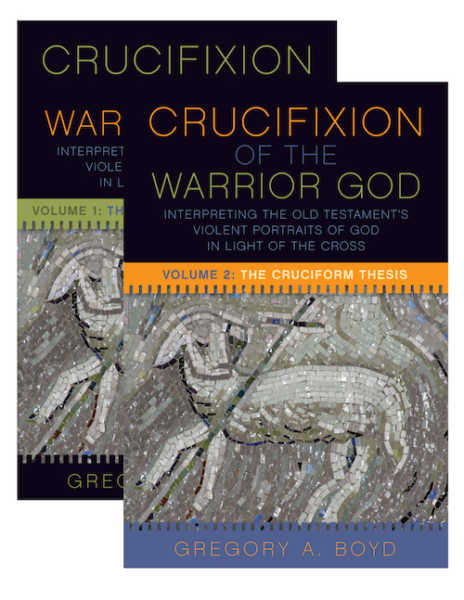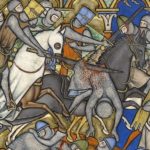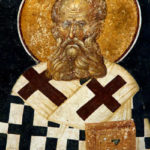We run our website the way we wished the whole internet worked: we provide high quality original content with no ads. We are funded solely by your direct support. Please consider supporting this project.

Endorsements for Crucifixion of the Warrior God
Greg has gotten some really great endorsements for his upcoming Crucifixion of the Warrior God, so we thought we’d share them with all of you. If you want to learn more, you can go here. Enjoy!
“We now have a plenitude of studies preoccupied with the vexed question of the violence of God in the Bible. But we have nothing like this study of Boyd who offers a major contribution and a significant advance in our thinking about the problem. Boyd brings his enormous erudition and his acute theological passion to the question. He looks the violence of God, as attested in the scripture, full in the face without flinching. But he submits that testimony to the absolute and ultimate truth of the cross that both permits and requires the recognition that we ‘are not supposed to take these violent portrayals at face value.’ Boyd mobilizes the remarkable resources of the Christian interpretive tradition to show that such divine violence is strategic, pedagogical, and accommodating but is not definitional for the truth of God that is to be found in the self-giving of God in the cross. This is a most welcome and daring study that may indeed change the terms of our ongoing wonderment about how to read scripture and how to trust and obey the God who dwells therein.”
—Walter Brueggemann, Columbia Theological Seminary
“Nothing shakes the faith of the morally sensitive more than the shocking violence of God as depicted in specific Old Testament texts, and yet nothing confirms the faith of the same people more than the cruciform love and peace of Jesus in the New Testament. Boyd’s proposal is to bring these two poles into a cruciform hermeneutic. The old approach of Marcion doesn’t resolve the problem, and neither do dismissals of the Old Testament in favor of the New nor do question-betting theological explanations help. What Greg Boyd does in The Crucifixion of the Warrior God is nothing less than a stunning re-imagination of how to read the Bible afresh through the cross of Jesus.”
—Scot McKnight, Northern Seminary, author of The King Jesus Gospel
“Gregory A. Boyd has written an impressive work: theologically alert, careful and thorough in its treatment of many difficult texts, comprehensively referenced, and moves in depth through both testaments. It deserves wide attention from readers across theological disciplines.”
—Terence E. Fretheim, Luther Seminary
“Reading Greg Boyd’s The Crucifixion of the Warrior God is like being swept into an ocean, overwhelmed by the breadth and depth of a new world discovered beneath the sea. Here a world is opened up where the violence of the Old Testament becomes not merely tolerable, but this violence now illumines the God who loves, never coerces and rejects all violence in Jesus Christ. A monumental work. Breathtaking in scope. A stunning accomplishment from one of the brilliant theological minds of our day. I could not be more thankful for a book.”
—David Fitch, BR Lindner Chair of Evangelical Theology, Northern Seminary, and author of Faithful Presence
“When I read most Scriptural treatments of violence, the enduring question of the coherence of Scripture is far too easily answered by wishful thinking or dismissing Scriptural texts that should rightly linger with us. In this evocative book, Greg Boyd has taken the canonicity of Scripture seriously, avoiding both the pitfalls of Marcionism and Christomonism, and articulated what promises to reset the conversation around Scripture and violence. Drawing upon a wide range of figures, from Origen and Augustine to T.F. Torrance and Karl Barth, Boyd constructs a christoform way of approaching Scripture that will not satisfy every question—I still have many!—but a way which is serious, sober, and theologically-sensitive. Boyd has pointed toward the Scriptural scandal of a God who is crucified, and asked us to stand still to consider the implications for how we engage a violent world.”
—Myles Werntz, T.B. Maston Chair of Christian Ethics, Hardin-Simmons University
“Directly addressing critics of the Old Testament God who see only violence in God’s nature—probably the common understanding of Yahweh throughout most of the Church age—Gregory A. Boyd is both ruthless and thorough in his responses. Boyd hears the text, he hears the context, and he hears the history of interpretation of the text—but he also hears most clearly the cruciform theology which, for Christians, must inform our final reading of the text. The phrase “magnum opus,” and the term “magisterial” truly apply to this two-volume work—for this is Boyd’s voluminous gift to the church as well as to the contemporary theological enterprise. I predict that these volumes will quickly take their place as must-reading for Christian exegetes and theologians of all stripes.”
—William Hamilton Barnes, University of Minnesota
“Divine violence in the Old Testament has, in recent years, become one of the most pressing problems for Christian thinkers. Common ways forward include either synthesizing this material with the non-violent portrait of God revealed in Jesus, or dismissing it as lacking in any real revelational import. In this ground-breaking new work, Boyd charts a third way, a largely unexplored path that recovers lost intuitions of the early church. In the process, he offers a new hermeneutic that promises to put ‘Christ and him crucified’ at the center of all biblical interpretation in a consistent fashion. This two-volume project is both sweeping in scope and stunning in its many insights.”
—Paul Rhodes Eddy, Bethel University
“Boyd has never shied away from tackling the most difficult and contentious issues that confront thoughtful Christians. And, as usual, his own convictions do not lie hidden. But if readers have followed the arguments they also know that careful research and discerning thought have been employed in order to reach his conclusions. With a work of such vast scope, most everyone will have disagreements, some may be serious, even fundamental. However, any careful reader will be rewarded with a substantial education about the issues.”
—Mark Thiessen Nation, Coauthor of Bonhoeffer the Assassin?: Challenging the Myth, Recovering His Call to Peacemaking
“Boyd contends that the Old Testament portraits of a violent God actually testify to the God of self-giving, nonviolent love revealed on Calvary. Is that possible? plausible? Only, says Boyd, if we understand the crucified Christ as the definitive self-revelation of God and therefore read all of Scripture with a cross-centered hermeneutic. Thoroughly researched and passionately written, this is a perceptive, timely, daring, and controversial proposal regarding one of the most important issues in Christian theology.”
—Michael J. Gorman, Raymond E. Brown Professor of Biblical Studies and Theology, Saint Mary’s Seminary and University
Category: General, Press
Tags: Crucifixion of the Warrior God, Cruciform Theology
Related Reading

What To Do With the Violent God of the Old Testament
For eight years Greg has been researching for and writing the book entitled The Crucifixion of the Warrior God. In it he confronts the commonly held idea that the Old Testament depictions of God behaving violently should be held alongside of and equal to the God revealed through Jesus dying on the cross. But if the Old Testament…

The Extremity of God’s Love
In response to questions he has received about whether Jesus was actually separated from the Father on the cross, Greg fleshes out his perspective on this. The love that unites the Trinity is the very same love that resulted in the separation of the Father from the Son. This separation actually expresses the great love…

The Violent “Church Triumphant”
In light of how central enemy-loving non-violence is to Jesus’ teaching and to his cross-centered revelation of God, we have to wonder why the church has refused to listen to its head and instead condoned violence, as pointed out in the previous post? Christian theologians have used OT’s violent portraits of God, at least since…

Will There Be A Launch Event for Crucifixion of the Warrior God?
In this episode Greg gives an update on book release plans for “Crucifixion of the Warrior God.” http://traffic.libsyn.com/askgregboyd/Episode_0038.mp3

Redefining Transcendence
God is transcendent, which basically means that God is “other” than creation. The problem is that classical thinking about God’s “otherness” has been limited to what reason can discern about God. As a result, all that can be said about his transcendence is what God is not. We are thus unable to acquire a positive…

How the Church Fathers Read the OT
After the completion of the New Testament, the church fathers developed theology in their increasingly Gentile post-apostolic church in such a way that many of the distinctively Jewish features of the NT’s use of the OT diminished. However, this was not the case with regard to the Christocentric interpretation of the OT that was so…
